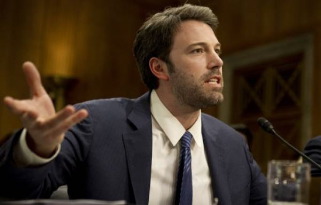 WASHINGTON – Hollywood star Ben Affleck called on Wednesday for targeted investment in the private sector in eastern Democratic Republic of Congo, where he sees a window of opportunity to end a cycle of unrest.
WASHINGTON – Hollywood star Ben Affleck called on Wednesday for targeted investment in the private sector in eastern Democratic Republic of Congo, where he sees a window of opportunity to end a cycle of unrest.
The A-list actor and director, who has founded a non-profit group called the Eastern Congo Initiative and has made repeated trips to the region, advocated the United States shift its priorities in delivering aid, in a hearing at the Senate Foreign Relations Committee.
People would rather be invested in than accept aid, would rather have a job than live in a camp,” he said.
Specific, small-scale investments are sometimes better than massive projects because they can be monitored more closely, Affleck argued, plugging his organisation’s involvement in building a partnership between local cocoa growers and organic chocolate company Theo.
“It’s good business for the Congolese and it’s paying off for this American company,” which will buy 640 tons of cocoa from Congolese growers this year, he said, emphasising “economic development is the key for sustainable growth.”
The Argo star testified alongside Roger Meece, former US ambassador to Kinshasa, and conflict economy expert Raymond Gilpin, from the Africa Center for Strategic Studies of the National Defense University.
Along with former Senator Russ Feingold, President Barack Obama’s envoy to the region, all four expressed optimism about progress in the conflict-torn, but resource-rich DRC, where they said a recent peace deal that ended hostilities with the M23 rebel group was a major step forward.
They praised the UN’s “intervention brigade,” whose mandate was extended beyond peacekeeping, as being pivotal in bringing about the peace deal.
But they said significant reforms to the security sector are needed, as well as elections.
Feingold noted that Washington has set aside $3.7 million to support the DRC’s next elections – a “paltry sum.”
“I think this is something we should heavily engage in,” he urged.
Affleck, who also met US Secretary of State John Kerry, said the troubled 2011 election, following a mostly well-regarded 2006 presidential vote, demonstrated the need for continued international involvement.
“This is a region that’s suffered enormous damage and trauma. And this fire is now abating a little bit, and we have a window where engagement on the part of secretary, the president, the Congress all collectively can make a real difference,” he said at the State Department.
“And I think historically, there’s an instinct to sort of put out one fire and go to the next fire. And this is a point where we can act to prevent the fire from igniting again.”
-AFP


Comment here
You must be logged in to post a comment.